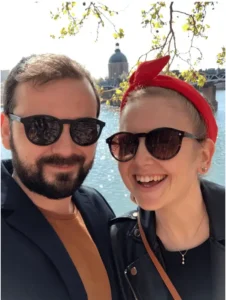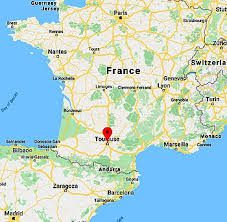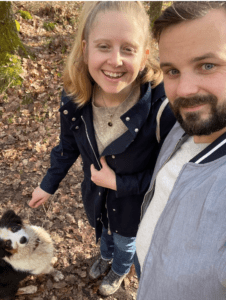Rebecca Chazin is a Colorado native that headed East for the green trees of Western Massachusetts, where she obtained a bachelor’s degree in Economics & Environmental Science & Policy from Smith College. After 9 wonderful years in the Valley she left to pursue a lifelong dream of living abroad. Since 2016 she has lived in France and Malaysia as well as traveling to so many incredible places in the world. She completed a masters of international business strategy in 2020 and now works as an international business development manager for a French international software company. She lives in Toulouse, France with her French partner Benoit and Luna – their goofy 10 month old Australian shepherd.

Could you talk about your experience studying French before ILI?
I studied French in high school for all four years. I also did two years of college French at Smith College. That’s how I ended up in Northampton. After high school French, I could say very limited things. I don’t know if you’re familiar with the International Baccalaureate program, but I took IB French, and I didn’t pass my exam. I still got my diploma, but it was the only exam that I failed.
When people tell you that what you are in high school doesn’t necessarily dictate what you’re going to be in the future, it’s very applicable to me. I thought I would never move to another country or speak another language. It wasn’t my thing. It wasn’t my path in life.
So what led you to take French classes and learn French at ILI?
So buckle up. This is a bit of a story.
In 2015, I had the chance to go with my father on a two week long trip to the Alps. We’re both really big Tour de France fans. The idea was to book a group tour that followed the stages of the Tour de France.
Though I had been to France once before, this was the first time I had gone outside of Paris.
It was so much different. It felt like a real French experience. We were in these small little towns. We met these really nice French people. We had a French cyclist guide. It was an American company, but they hired local guides.
On this tour there were people from all over the world–an Australian, an Italian, Americans who had spent time abroad. Meeting all these people inspired me to consider: How could I live internationally? How could I travel more?
I wanted to be capable of speaking the foreign language of wherever I would go. I said, Hey, I have almost six years of French knocking around somewhere. I can say bonjour, I can order a coffee. Maybe I could turn that ordering a coffee into something else.
So I kind of took the easy route. Why reinvent the wheel, you know? I really liked French too. I didn’t pick France just because I had some language already. I love French culture. I love French people. I just felt at home during those two weeks in France. It was weird.
Could you elaborate on why you felt so at home while traveling in France? Something about French culture? Your past experience taking French classes?

Something felt very right to me about the way of life in France. It’s more laid back. It sounds cheesy to say, but there’s a joie de vivre, a joy of life. They just take time to enjoy things.
I read once that the French spend the most time of any European culture eating meals. Dinner or lunch in France is going to be two hours long, and you sit at the table. I remember arriving in France and thinking, “Oh my God, I’ve never eaten a meal this long!”
Christmas dinner with my in-laws is like a four or five hour meal. It’s so long, but it’s so enjoyable. Food is such a central part of French life. The French take time to enjoy even the smallest thing like a coffee with a colleague.
Americans have a tendency to think okay, next, next, next. My French colleagues and friends say stuff like, “Rebecca, just relax, be in the moment. lt’s gonna be okay.” I’m just always thinking about the future, like, “What’s next? What’s next?” It’s nice to embrace being in the moment and enjoying each other’s company.
What was it like when you first started reactivating those six years of old French skills?
When I signed up for classes at ILI, I said I have six years of French, and they were like, “Okay, we’re going to do a test. The professor is gonna call you, and she’s gonna test your, your level. I thought, “Oh, crap. I have six years of French. I don’t know where they are.”
The ILI instructor calls me, and I remember this exactly. She asked me to describe what I like to do for leisure in my off time, and I just remember pulling a blank. l said stuff that I don’t actually do but I knew the vocabulary for!
In the first class I remember being so nervous. It was the advanced beginner French class. I was so nervous that I wouldn’t pick it up as much as I did in high school or in college, or that I’d be the worst in the class at putting together a sentence.
My fears were completely off base. I would make a mistake, but what was so great is that Sabine as a professor would correct us in a very nice, encouraging way. She would allow us to finish. She always corrects people as a way of getting better and not to point out that you made a mistake, because when you’re learning a language people are most afraid of making mistakes.
But what Sabine really taught me is that it’s okay to make a mistake, you can laugh it off. The most important thing when you learn, especially a second or third language, is that you just try to put together a sentence, you try to say something. At the end of the day, if people understood what you said, and it wasn’t grammatically correct, no one’s going to care. Everyone’s going to remember that they understood what you said, not that you made some glaringly obvious grammatical mistake.
It’s interesting because I see parallels now. Because I work in France, I have French colleagues who want to practice their English. They’ll go, “Oh, Rebecca, I’m so bad at English because I make so many mistakes.” And I tell them, “Just try, I don’t care if you make a mistake. I make mistakes in English all the time. I’m not perfect.” It’s interesting to compare because I understand what they’re going through.
Let’s talk some more about the process from beginning French classes to relocating to France. How did that unfold?

When I started French classes at ILI, I thought, “Okay, if I really like taking languages again, who knows what that will lead to? But in the back of my head, I think I always knew it was going to lead to me taking a big trip or moving abroad.
Finally, I just loved going to my classes so much. I was like, “Oh my god, this is so much fun. I love doing my homework.” And I’m not someone who really ever liked doing homework. I remember coming home from work and being like, “Oh, I get to do my French homework!”
I was progressing quickly.
Something you don’t hear every day. “Yay, I can’t wait to do my French homework!” You say you progressed quickly in your French classes. Why do you think you are able to learn French fast?
Because it wasn’t like it was in high school, where it was all about reading and writing. Speaking was something that came last. And I think you can tell I like to talk! I can write, I can read, but I want to be able to talk to people.
So, I came back from class one day and I Googled how to move to France as an American.I went down this big rabbit hole because I’ve never had to deal with visas and work permits. I realized that it’s not as easy as it looks on TV shows.
I found a blog of an American girl who had moved to France as an au pair. She explained how she found her family, how she moved there, how she did the visa process. And I was like, “I could do that.”
At that point, I was five years out of college. I had a real job at a software company. But I could take a year off. I could just learn French and take care of children.
So, I started looking for a family. I joined this website. As an au pair, you create your profile, you talk about what kind of experience you’re looking for. And then families had profiles as well. You could message families or families could message you. I had five or six interviews with different French families.
It all happened very quickly. I started looking for families in November, and then I had a family by January. If I was going to be an au pair for the following school year, I wanted to give myself enough time to do the visa stuff. There were documents that had to be approved and sent in.
Having lived in France now for almost five years, French bureaucracy is super long. So, you know, we just wanted any French family that I met with was like, Okay, well, you know, we need to make the decision tomorrow, because we need to put into motion all of the people that it’s that slow paced lifestyle that you like so much.
In July of 2016, I moved to France and worked as an au pair until July 2017. Then I followed my French boyfriend to Malaysia and we lived there for a year. I wanted to get a master’s degree in France because that would allow me to stay more permanently. Having a degree from a French university really helps for jobs. So we moved back in 2018 to get my master’s in international management. In March 2020. I started a full time contract position with a French company here. Great time to start a new job!
While all this was happening, were you taking online French classes or in-person French lessons?
I was taking ILI French classes all throughout finding my family. It was fun because I’d come into class and I’d be able to tell Sabine and my classmates about how I had an interview with a family. It was the only place I had because I hadn’t told my parents yet. I hadn’t told other people in my life because I just didn’t know what was going to happen, and I didn’t know what they were going to say. It was a nice way to share this experience with people and to continue practicing French.
What happened next was that I was going to quit my job. I was trying to save money. I told Sabine, I can’t take classes for next semester because I need to save my money. I was going to be more or less without a job. Being an au pair doesn’t pay very well. She said, “You should talk to the ILI administration because they might offer volunteer work in exchange for lowering tuition.”
So I did, and ILI gave me the opportunity to volunteer for them. I distributed flyers at businesses and stuff like that. Without that, without ILI being so nice and caring about their students. I wouldn’t have been able to keep taking French classes. It really set me up.
Would you recommend studying French or learning a new language as an adult?

I would definitely recommend studying a language as an adult. Studying French taught me a big lesson about being patient with yourself. Learning a language is a long process, especially when you’re older. I really learned how to persevere, to persist, and how to make mistakes, which I’ve never really been very good at. In language learning, you’re going to make mistakes.
Even now, it’s fun to think about how working in France every day I make mistakes with my friends. It doesn’t bother me as much as it used to. That’s because when learning a language and becoming passionate about it, the goal is to communicate.
Related articles about studying Spanish, learning French, taking Portuguese lessons, and more:
- Great ways to learn Spanish online and why it’s important.
- Top 7 reasons to speak and learn Spanish fluently in the USA.
- Improve your listening skills in 4 easy steps!
- The Rejection of Perfection in Learning a Language
- Spanish is Darlene’s Superpower: Interview with Darlene, a Spanish language student living in the USA.
- World of jazz: Interview with Andy Jaffe, a Portuguese and Chinese language student living in the USA.
- Kathy Learning Spanish (again): Interview with a Spanish language student living in the USA.
- How Alice Flexes her Brain Through French film: Interview with a French and Spanish language student living in the USA.
- Charles the language person: Interview with an Italian and German language student living in the USA.
- Takehiro Rises: Interview with an ILI English student from Japan who built a career in the USA.